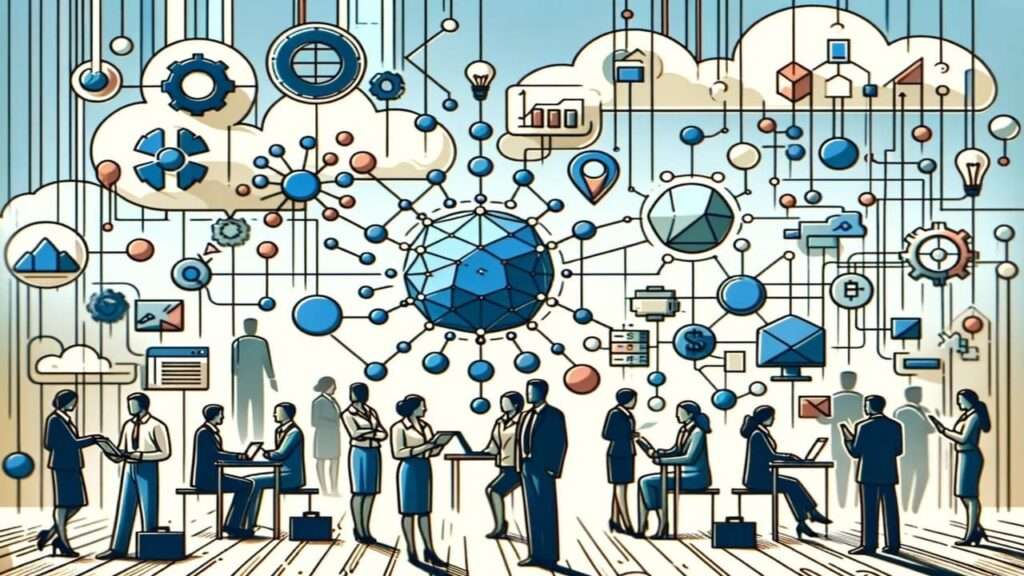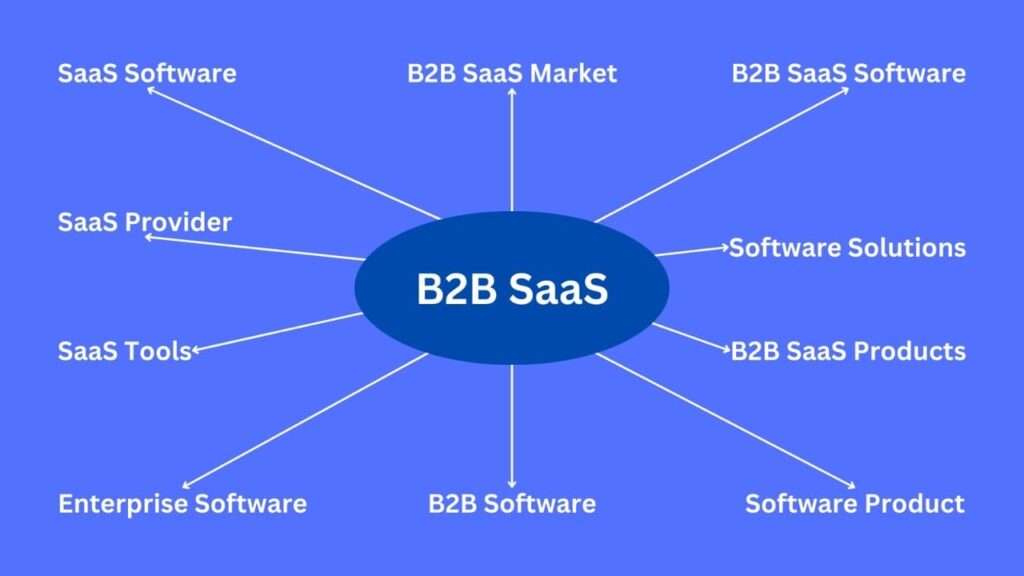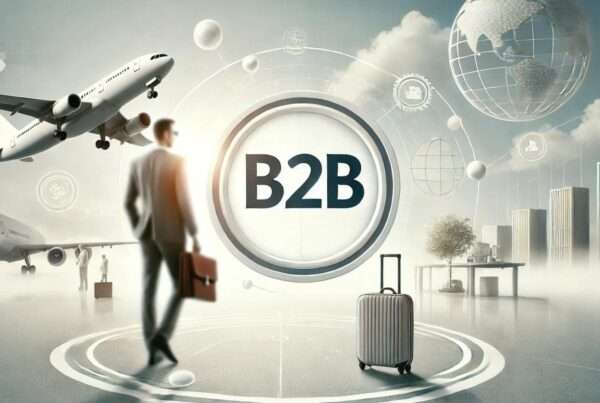
In today’s evolving business world, companies constantly seek efficient solutions to streamline operations and reduce costs. Enter B2B SaaS, a game-changer for businesses looking to leverage cloud-based software for a competitive edge.
But what exactly is B2B SaaS, and how can companies craft effective marketing strategies to thrive in 2024?
This article provides a comprehensive guide to understanding B2B SaaS and outlines marketing strategies that will be crucial for success in the coming year.
What is Software as a Service (SaaS)?
Software as a Service (SaaS) is a cloud-based software delivery model. Companies use SaaS applications without installing them locally. SaaS providers manage the software’s maintenance and updates. This model allows for scalable and flexible software solutions. Key benefits of SaaS include:
- Cost-effectiveness: Reduces upfront software costs.
- Accessibility: Users can access the software from anywhere.
- Regular updates: Providers ensure the software is up-to-date.
Business-to-Business (B2B) Model

In the B2B model, companies provide products or services to other businesses. Unlike B2C, B2B focuses on meeting the needs of organizations. B2B transactions often involve larger quantities and longer sales cycles. This model encompasses various industries, including software, manufacturing, and services.
Key characteristics of B2B include long-term relationships, complex decision-making processes, and a focus on value-added services. In the digital age, B2B companies leverage technology to streamline operations and enhance customer experiences.
What is B2B SaaS?
B2B SaaS has transformed how companies access and use software. Unlike traditional software, SaaS offers cloud-based solutions that are scalable and cost-effective.
The evolution of B2B SaaS is marked by the rise of subscription models, allowing businesses to pay for software on a usage basis. This shift has led to increased adoption of SaaS tools across various industries.
Advancements in technology, such as AI and automation, have further enhanced the capabilities of B2B SaaS, making it a critical component of modern business operations.
Key Components of B2B SaaS

1. SaaS Software:
SaaS stands for Software as a Service. It is cloud-based software used by businesses to access various applications over the internet. Unlike traditional software, SaaS allows companies to subscribe to software solutions without the need for hardware installation. This model provides flexibility and scalability, making it an attractive option for small businesses and startups.
2. B2B SaaS Market:
It is rapidly growing as companies worldwide adopt cloud-based solutions to enhance their operations. With a focus on business-to-business software, this market offers a range of products and services tailored to meet the specific needs of enterprises. The increasing demand for efficient and cost-effective solutions is driving the expansion of the B2B SaaS industry.
3. B2B SaaS Software:
It refers to cloud-based applications designed specifically for business-to-business interactions. These software solutions offer features such as sales performance management, marketing automation, and enterprise resource planning (ERP). By leveraging B2B SaaS software, companies can improve their sales and marketing efforts, streamline their operations, and achieve better overall performance.
4. Software Solutions:
Software solutions in the B2B SaaS space encompass a wide range of applications aimed at solving business problems. From CRM and ERP systems to marketing platforms and e-commerce platforms, these solutions provide companies with the tools they need to operate efficiently. The flexibility and scalability of SaaS software solutions make them an essential component of the modern business landscape.
5. B2B SaaS Products:
B2B SaaS products are cloud-based software solutions tailored for businesses. They focus on streamlining operations and enhancing productivity. Unlike traditional software, these products are often subscription-based, offering flexibility and scalability. Leading B2B SaaS products include CRM systems, project management tools, and marketing automation platforms. They provide a competitive edge by automating tasks and providing insightful analytics.
6. Software Product:
A software product in the B2B SaaS context refers to a cloud-based application designed for businesses. These products address specific industry needs, such as accounting, HR, or sales performance management. Software products in the B2B SaaS space are known for their ease of integration, user-friendly interfaces, and robust security features. They enable companies to improve efficiency without significant upfront investment.
7. B2B Software:
B2B software encompasses a range of applications aimed at meeting the needs of businesses. It includes solutions for marketing and sales, customer relationship management, and supply chain management. B2B software is characterized by its ability to facilitate collaboration, streamline processes, and provide actionable insights. In the world of B2B SaaS, this software is accessible from anywhere, enhancing flexibility and agility.
8. Enterprise Software:
Enterprise software is designed for large organizations to support complex operations and processes. It includes ERP systems, business intelligence tools, and supply chain management solutions. In the B2B SaaS market, enterprise software is cloud-based, offering scalability and real-time data access. It helps companies worldwide to manage their resources efficiently and make informed decisions.
9. SaaS Tools:
SaaS tools are cloud-based applications that provide various services to businesses. They include tools for project management, customer support, and collaboration. SaaS tools are popular among small businesses and startups due to their affordability and ease of use. They enable companies to access advanced technology without significant investment in hardware or software development.
10. SaaS Provider:
A SaaS provider is a company that offers cloud-based software solutions to businesses. These providers manage the infrastructure, security, and maintenance of the software. SaaS providers in the B2B space offer a range of products and services tailored to business needs. They play a crucial role in the SaaS industry, enabling companies to leverage the benefits of cloud computing without the complexities of managing it in-house.
5 Benefits of B2B SaaS
B2B SaaS, or business-to-business software as a service, is revolutionizing how companies operate. This cloud-based software model offers numerous advantages, particularly for small businesses and startups. Here are five key benefits of adopting B2B SaaS solutions:
- Cost-Effectiveness: Unlike traditional software that requires hefty upfront investments, B2B SaaS operates on a subscription basis. Companies can improve their cash flow by avoiding large capital expenditures and paying only for what they use.
- Scalability: B2B SaaS solutions offer the flexibility to scale up or down based on business needs. This is especially beneficial for companies experiencing rapid growth or seasonal fluctuations.
- Ease of Use and Maintenance: Software providers handle the maintenance, updates, and security of B2B SaaS applications. This means companies can focus on their core business activities without worrying about software upkeep.
- Accessibility: These platforms are accessible from anywhere with an internet connection. This supports remote work and ensures that teams can collaborate effectively, regardless of their location.
- Innovation and Integration: B2B SaaS companies often subscribe to solutions that are at the forefront of technology. This provides access to the latest features and integrations with other tools, enhancing overall business efficiency.
In summary, Business-to-Business SaaS offers a better opportunity than traditional software models, particularly for companies looking to stay agile and competitive in the fast-paced business environment.
Also Read: Connectively: HARO’s New Era in PR Networking
Understanding the B2B SaaS Market
The B2B SaaS market is a dynamic landscape where software providers cater to businesses. Unlike traditional software, SaaS solutions offer cloud-based software used by businesses for various functions. The world of Business-to-Business SaaS is vast, with companies worldwide leveraging these platforms for efficiency. B2B SaaS platforms are particularly appealing to small businesses and startups due to their scalability and cost-effectiveness.
Leading B2B SaaS companies often subscribe to these solutions to improve their operations. The significance of B2B SaaS lies in its ability to provide software as a service, making it a vital component of the modern business ecosystem.
10 Best B2B SaaS Marketing Strategies for 2024
1. Leverage Content Marketing:
In the world of B2B SaaS, content marketing reigns supreme. By creating informative and engaging content, companies can attract potential customers and establish their brand as a thought leader in the industry. This can include blog posts, whitepapers, and webinars that address the pain points and needs of their target audience.
2. Implement SEO Tactics:
SEO is crucial for Business-to-Business SaaS companies to improve their online visibility and attract organic traffic. This involves optimizing website content with relevant keywords, improving site speed, and building quality backlinks. By focusing on SEO, companies can ensure that their products and services are easily discoverable by potential clients searching for software solutions.
3. Utilize Social Media:
Social media platforms are powerful tools for B2B SaaS companies to connect with their audience and promote their products. By sharing valuable content, engaging with followers, and running targeted ads, companies can increase their brand awareness and generate leads. Platforms like LinkedIn are especially effective for B2B marketing due to their professional user base.
4. Email Marketing Campaigns:
Email marketing remains one of the most effective ways to nurture leads and convert them into customers. SaaS companies can use email campaigns to keep subscribers informed about new features, updates, and offers. Personalization and segmentation are key to ensuring that the content is relevant and valuable to the recipient.
5. Invest in Paid Advertising:
Paid advertising, such as Google Ads and LinkedIn Sponsored Content, can provide a significant boost to a B2B SaaS company’s marketing efforts. By targeting specific demographics and keywords, companies can ensure that their ads are seen by potential customers who are actively searching for software solutions. This can lead to increased website traffic and higher conversion rates.
6. Focus on the Customer Experience:
Understanding that SaaS companies thrive on subscriptions, enhancing the customer experience becomes paramount. To stay ahead, SaaS providers must ensure their software solutions are not just effective but also user-friendly. Regular feedback loops can help improve products and services, making them more aligned with customer needs. Personalizing the customer journey can significantly increase satisfaction and loyalty among users, driving long-term success in the competitive SaaS industry.
7. Leverage Marketing Automation:
In the world of B2B SaaS, marketing automation stands out as a powerful tool to streamline marketing campaigns and sales processes. By creating automated marketing campaigns, companies can efficiently nurture leads, saving time and resources. Moreover, leveraging AI in marketing automation can provide insights into customer behavior, allowing for more targeted and effective marketing strategies. This approach not only optimizes marketing efforts but also enhances overall sales performance management.
8. Partner with Other B2B Saas Companies:
Collaboration is key in the B2B space. By partnering with other B2B companies, SaaS providers can tap into new markets and expand their reach. This strategy can be particularly effective for small businesses and startups looking to gain a foothold in the crowded SaaS market. Joint marketing campaigns or offering complementary services can create a win-win situation, driving growth and increasing visibility among target audiences.
9. Attend Industry Events:
Attending industry events is a vital strategy for B2B SaaS companies to network, learn about the latest trends, and showcase their solutions. Whether it’s a cloud-based software conference or a general tech meet-up, these events offer a platform to connect with potential clients, other software providers, and influencers in the SaaS world. Engaging in these gatherings can significantly boost a company’s profile and open up new opportunities for collaboration and growth.
10. Implement Account-Based Marketing (ABM):
ABM is a strategic approach where marketing and sales teams work together to target specific accounts with personalized campaigns. For SaaS companies, ABM can be particularly effective in reaching high-value clients. By focusing on the needs and interests of specific businesses, companies can tailor their offerings more precisely, resulting in higher conversion rates. This targeted approach ensures that marketing efforts are more aligned with the overall business objectives, leading to better ROI.
Measuring Success and ROI
Measuring success and ROI in the world of B2B SaaS involves analyzing key metrics. Companies can improve their sales performance management through effective marketing campaigns. Unlike traditional software, SaaS solutions offer scalable advantages. B2B SaaS platforms enable businesses to create automated marketing campaigns, enhancing ROI.
Conclusion
As we have moved to 2024, the B2B SaaS landscape continues to evolve, offering both challenges and opportunities. Companies must stay adaptable, leveraging data-driven insights, personalization, and innovative marketing strategies to stay ahead. By focusing on customer needs, embracing digital transformation, and optimizing marketing efforts, B2B SaaS providers can achieve sustained growth and success in this dynamic industry. Are you ready to navigate the future of B2B SaaS marketing?
FAQs
1. How is the B2B SaaS market expected to grow in 2024?
The Business-to-Business SaaS market is anticipated to grow significantly in 2024. Revenue is projected to reach $232 billion, indicating a continued upward trend in the industry.
2. How important is SEO for SaaS marketing?
SEO is crucial for SaaS marketing. It improves visibility, attracts organic traffic, and generates leads. SEO involves optimizing on-page elements, earning backlinks, and ensuring the website is well-configured for search engine algorithms.
3. What role does AI play in B2B SaaS marketing?
AI plays a significant role in B2B SaaS marketing. It enables personalized experiences, automates repetitive tasks, and provides insights for data-driven decision-making. AI helps optimize marketing campaigns and enhance customer engagement.
4. How can SaaS companies leverage user testimonials in marketing?
Business-to-Business SaaS companies can leverage user testimonials by showcasing them on their website and social media. Testimonials provide real-world proof of the value and effectiveness of their solutions.
5. What is the significance of inbound marketing for B2B SaaS?
Inbound marketing is significant, It focuses on attracting and nurturing leads through valuable content, SEO, and social media engagement. It helps establish authority, build trust, and guide prospects through the sales funnel.



